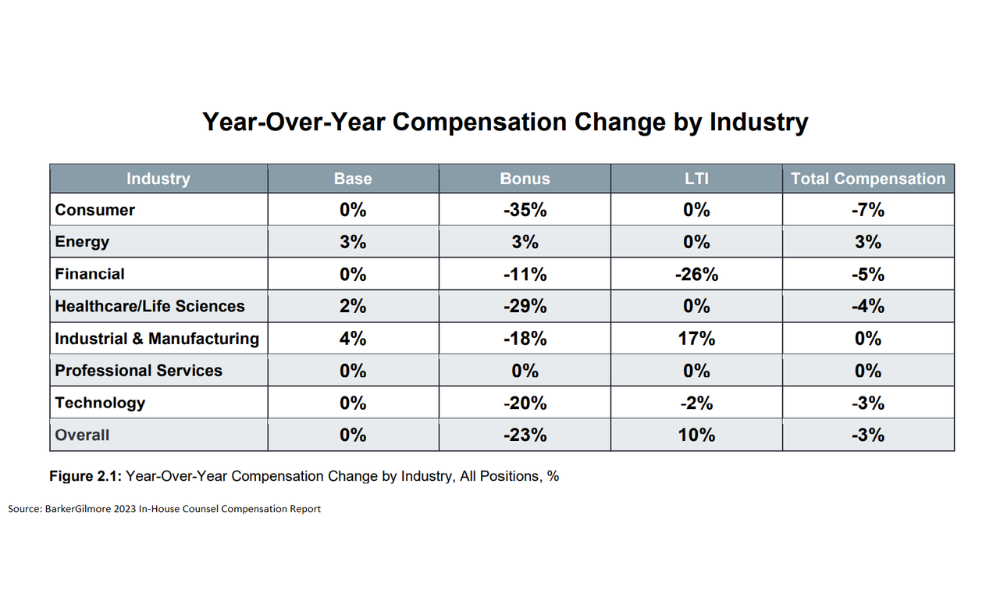Overall, 2022 compensation remained strong, leader says

Executive search firm BarkerGilmore has released its annual in-house counsel compensation report, revealing compensation and long-term incentive (LTI) trends among in-house counsels across seven industries throughout 2022.
“This year’s report reveals new insights related to practice areas, general counsel compensation, and portfolio company compensation compared to private and public companies,” said BarkerGilmore founding partner John Gilmore. “Overall, 2022 compensation remained strong, and companies continued to motivate and reward their teams. BarkerGilmore had an outstanding year placing women and minority candidates into leadership positions – I am very proud.”
BarkerGilmore – a boutique executive search firm which specialises in building world-class legal and compliance departments for U.S. companies – administered the 2023 in-house counsel compensation survey in March 2023. Around 3,800 in-house counsels at various levels of seniority and from different industries and practice areas participated in the survey.
Industries and practice areas
The median total compensation across all industries was down by 3% from 2021. While base compensation remained the same and LTI increased by 10%, bonuses were cut by almost 25% compared to the previous year. Across the consumer, energy, financial, healthcare, industrial, professional, and tech sectors, only the energy industry saw an overall increase (+3%) in compensation. Compensation in the consumer industry dropped by 7% in contrast.

BarkerGilmore found that public tech, industrial, and energy companies paid their general counsels the highest total compensation, while in the private sphere, the financial, tech, and consumer industries paid their general counsels the most.
Banking and finance was the highest-paying practice area for managing and senior counsels in 2022, followed by tax and energy. Labour, compliance, and privacy were the lowest-paying practice areas.
Public companies continued to surpass private and portfolio total compensation at all in-house position levels, although general counsels at portfolio companies had better LTI compensation compared to those in private and public companies.
New positions
While only 11% of respondents were hired into new roles in 2022 – representing a 1% annual decrease – 40% of new legal hires received sign-on bonuses, increasing by 8% from 2021. Managing counsels were the likeliest to receive a sign-on bonus (46%), while general counsels received the biggest median sign-on bonus (US $75,000) compared to managing counsels (US $28,000) and senior counsels. (US $20,000).
The number of lawyers who had been in their roles between one and five years was up by 7%, reflecting the record levels of hiring that took place in 2021.
Law school and law firm value
The BarkerGilmore survey also found that the largest group of in-house lawyers went to top law schools and worked at top law firms. Additionally, coming from a top law firms and top law school merited a total salary 76% bigger than those who did not come from a top law school or work at a firm. In-house lawyers who went to one of the top 50 law schools in the U.S. made 30% more than those who came from law schools ranked 100 and below. In-house lawyers who worked at AM’s top 50 law firms made over 50% more than those without law firm experience.
Reporting and responsibilities
Most lawyers working as general counsel reported directly to the CEO of the company (85%) and concurrently acted as the company’s corporate secretary (68%), chief compliance officer (54%), or government affairs officer (15%). General counsels who additionally functioned as corporate secretaries were found to make 50% more than those who did not, while general counsels who were also their organisations’ chief compliance officers made 25% more than those who did not. General counsels who handled government affairs made 42% more than general counsels who did not.
Taking on the additional responsibilities of a risk officer, chief human resources officer, and chief administrative officer, was negatively correlated with total general counsel compensation.










